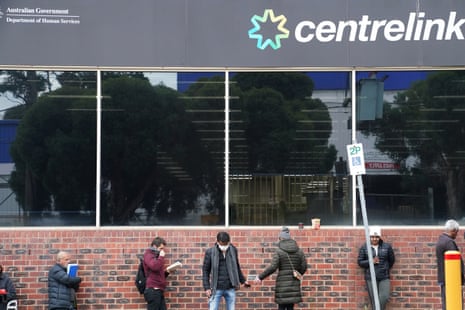Centrelink will not raise or recover welfare debts for six months during the coronavirus crisis, the government services minister, Stuart Robert announced on Friday.
The decision, which was described as a pause on “certain debt activity”, follows reporting in the Guardian that Services Australia staff were chasing welfare recipients over alleged debts last week at the height of unprecedented demand for Centrelink services with phone lines jammed, the MyGov website crashing and thousands of Australians in dole queues around the country.
But despite the pause, Services Australia quietly issued a notice on Friday that it intends to use Medicare data for a data matching program to include “detecting overpayments and recovering debt”.
The notice raises the prospect that – although the government has abandoned sole reliance on the controversial “income-averaging” method to calculate robodebts – it could now arm itself with Medicare data to continue to pursue suspected underpayments.
Robert said the pause would last at least six months and allow the government to redeploy staff to process benefits claims.
He confirmed that people could apply to the agency to have existing debt repayments stopped and said “fraud and serious non-compliance” action would continue.
“The decision allows Australians to focus on their personal situation during these difficult times, and supports the government’s priority to get assistance to people as quickly as possible,” Robert said.
The notice states that Medicare data will be used to “make sure Centrelink payments are only made to people who are entitled to those payments” and “help the whole-of-government approach to identify serious and complex fraud so the integrity of payments and taxpayer expectations are met”.
Information that can be data-matched between Centrelink and Medicare databases are: standardised first and surname, nickname/alias standardised, gender, date of birth, address, email address, telephone number, and Medicare benefits schedule usage (date of last service).
“Services Australia expects to match approximately 9.8 million unique records held in its Centrelink database,” it said.
“Based on fraud criteria, Services Australia anticipates it will examine approximately 5,000-9,000 records per year.”
The government faced calls to pause debt recovery as early as 20 March, given it had taken such actions swiftly during the recent bushfires crisis.
But Services Australia had said only that the agency had hardship provisions available.
Last week, the social services minister, Anne Ruston, told the Senate “over the last few days every resource that has been available within Centrelink and all external resources that we have been able to access have been moved into the processing of the new payments”.
Since then, welfare recipients have sent the Guardian copies of “Accounts Payable” debts letters issued by Centrelink during the coronavirus crisis.
Last week, the government was still working on and sending out welfare debt notices like these while Centrelink was failing to cope with unprecedented demand from Australians out of work due to #Covid_19 #auspol pic.twitter.com/Byb4dlElCK
— Luke Henriques-Gomes (@lukehgomes) April 3, 2020
One debt letter, which was issued by Services Australia on 23 March, asks the recipient to repay $6,500 and states that the amount is due on 21 April. On the same day, the MyGov website crashed due to demand so significant Robert initially attributed to a cyber attack before backtracking.
Another Family Tax Benefit debt letter for $5,700 seen by the Guardian was issued on Tuesday, 31 March, one day after the government announced the jobkeeper wage subsidy program. The listed due date is 29 April. Debt recipients can ask Centrelink to pay the money back over a payment plan.
The Greens senator Rachel Siewert said she was pleased the government had “finally” paused welfare debt action.
“I was told two weeks ago in the Senate by the Minister for Social Services that debt recovery had been suspended, now two weeks later we have confirmation from Minister Robert,” she said.
“Constituents have been contacting us with debts that were raised against them this week.”
But Siewert said the government should go further, by guaranteeing to suspend all debts raised under the income compliance program, widely known as robodebt.
“The government has to guarantee that all robodebts are suspended including people who are on existing payment plans,” she said.
The Guardian revealed last week the government has been working on a secret plan to repay hundreds of thousands of Australians under the botched robodebt program.
The government declined to comment on the leaked plan, citing an ongoing class action against the scheme.
Services Australia has paused new debt reviews under the robodebt program, but has been continuing to finalise existing reviews, the Guardian understands.
People who have welfare debts against their name can be barred from accessing advance payments, which are available to social security recipients in financial distress.
Hank Jongen, a Services Australia spokesman, said the debt pause would apply to a “broad range of debt raising and recovery activities, including those connected to social security payments, Family Tax Benefit and Child Care Subsidy”.
“Activities that will cease include referrals to external collection agencies, as well as the garnisheeing of tax refunds,” he said.
“During the pause we are not asking customers to commence repaying money they owe to the agency except where it relates to fraud or serious non-compliance.
“All open reviews under the online income compliance programme will also cease unless customers choose to continue their review. Customer requested reassessments and appeals on finalised reviews will also continue.”
